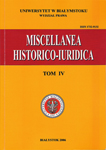Nowe ustawodawstwo w nowym ustroju. O prawie karnym i cywilnym w pierwszym dwudziestoleciu Polski Ludowej
New Legislation in New System of Government. Penal and Civil Law During First Twenty Years of Communist Poland
Author(s): Adam LityńskiSubject(s): Law, Constitution, Jurisprudence, Criminal Law, Civil Law, Recent History (1900 till today), History of Communism, Penal Policy
Published by: Wydawnictwo Uniwersytetu w Białymstoku
Summary/Abstract: The problem what to do with the old law in new political circumstances in the 20th century in Poland – during the period of less than 75 years – occurred three times. These milestones were: gaining the independence after World War I, implementing Communist system after World War II and regaining independence after 1989. This text refers to changes in penal and civil law between years 1944 and 1964 – after taking power by Communists.In 1944, because of tactical reasons, Communists pretended that they preserved the continuity of legal system. They treated this problem instrumentally. In practice, they rejected regulations which were incompatible with the rules of new system. They claimed that legal regulations issued before 1939 were still in power, but, on the other hand, they demanded that “new class consistence” should be put into old legal norm. Because of that, new interpretation of old law played important role in the transformation of legal system. It was clearly seen in the jurisdiction of Supreme Court. After ten years of Communist power the legal system was completely different from the pre–war one, although formally old codes and other regulations still existed.Simultaneously, works on codifying civil law and recodifying penal law were held.They were ended in the 60’s.
Journal: Miscellanea Historico-Iuridica
- Issue Year: 4/2006
- Issue No: 1
- Page Range: 121-141
- Page Count: 21
- Language: Polish

